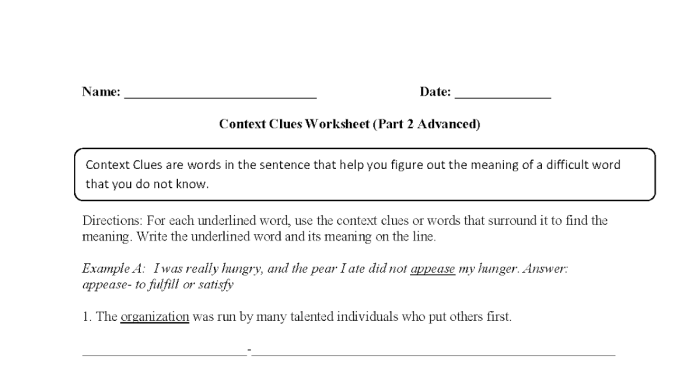Embark on an enlightening journey with the Context Clues 3.7 Answer Key, your guide to deciphering unfamiliar words with ease. This key unlocks a treasure trove of knowledge, empowering you to navigate the complexities of language with confidence.
Delve into the intricacies of context clues, exploring their diverse types and unraveling their power to illuminate word meanings. With this key in hand, you’ll become a wordsmith, effortlessly grasping the essence of unfamiliar terms.
Understanding Context Clues
Context clues are hints or cues within a text that can help readers determine the meaning of unfamiliar words or phrases. These clues can be found in the surrounding words, sentences, or paragraphs and provide information about the context in which the unfamiliar word is used.
There are several different types of context clues, including:
Definition or Explanation, Context clues 3.7 answer key
The unfamiliar word or phrase is directly defined or explained within the text. For example, “The word ‘auspicious’ means favorable or fortunate.”
Answer Key Analysis: Context Clues 3.7 Answer Key

Using context clues is an essential skill for comprehending written text. The answer key provides a valuable tool for checking the accuracy of your answers and improving your ability to use context clues.
The context clues 3.7 answer key can be really helpful when you’re trying to solve crossword puzzles. In fact, if you’re a crossword enthusiast, you might want to check out the you can dig it crossword . It’s a fun and challenging puzzle that will test your knowledge of words and their meanings.
And who knows, you might even learn a few new words along the way. But don’t forget to come back to the context clues 3.7 answer key if you get stuck!
Identifying Different Types of Questions
Context clues can be used to answer a variety of questions, including:
- Meaning of words:What does a particular word or phrase mean in the context of the text?
- Author’s purpose:What is the author’s main goal in writing the text?
- Tone and mood:What is the author’s attitude towards the subject matter?
- Inferences:What can be concluded from the information provided in the text?
Using the Answer Key
The answer key provides the correct answers to the questions in the text. To use the answer key effectively, follow these steps:
- Check your answers:Compare your answers to the ones provided in the answer key.
- Identify areas for improvement:Note any questions that you answered incorrectly.
- Review the text:Go back to the text and re-read the passages that relate to the questions you answered incorrectly.
- Look for context clues:Identify the specific words or phrases in the text that helped you determine the correct answer.
Tips for Improving Your Ability to Use Context Clues
Here are some tips to help you improve your ability to use context clues:
- Read widely:The more you read, the more context clues you will encounter and the better you will become at using them.
- Pay attention to unfamiliar words:When you come across a word you don’t know, don’t skip over it. Take the time to look it up in a dictionary or thesaurus.
- Use context to infer meaning:Don’t just rely on the dictionary definition of a word. Consider the context in which it is used to determine its specific meaning.
- Practice, practice, practice:The best way to improve your ability to use context clues is to practice regularly.
Practice Exercises
Practice exercises are essential for students to test their understanding of context clues and to develop their ability to use them effectively in their reading. The following exercises will help students to identify different types of context clues and to use them to determine the meaning of unfamiliar words.
Table Exercise
Create a table with four columns: Word, Context, Clue Type, and Meaning. Provide a list of unfamiliar words with context sentences. Have students use context clues to determine the meaning of each word and fill in the table.
This exercise will help students to identify different types of context clues and to see how they can be used to determine the meaning of unfamiliar words. It will also help students to develop their vocabulary and their understanding of how language works.
Assessment
Quiz Design
To assess students’ understanding of context clues, design a quiz or worksheet that includes questions requiring them to:
- Identify the type of context clue used (synonym, antonym, definition, example, inference).
- Determine the meaning of unfamiliar words based on the provided context.
Grading Rubric
Provide a grading rubric that evaluates student performance based on:
- Accuracy in identifying context clue types.
- Correctness in determining word meanings.
- Completeness and clarity of explanations.
Common Queries
What are context clues?
Context clues are hints or pieces of information within a text that help you determine the meaning of unfamiliar words.
How can I use the Context Clues 3.7 Answer Key?
Refer to the answer key to check the accuracy of your answers and identify areas for improvement in your ability to use context clues.
What types of context clues are there?
There are various types of context clues, including synonyms, antonyms, definitions, examples, and inferences.